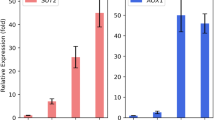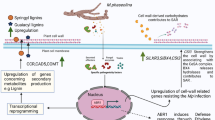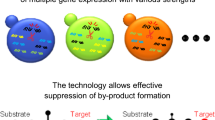Abstract
Andrimid is a potent antibiotic that inhibits acetyl-CoA carboxylase. However, its low biological yield and complex chemical synthesis have hindered its large-scale application. In this study, we found that the LysR-type transcriptional activator AdmX controls andrimid yield by adjusting its expression level in the andrimid-producing bacterium Erwinia persicina strain BST187. Our results showed that gradually increasing of admX transcriptional levels significantly improved andrimid yield, while the yield declined when admX was overexpressed excessively. To further estimate the effect of AdmX on andrimid promotion, we fitted and developed a model which was y = −0.5576x2 + 61.945x + 800.63 (R2 = 0.9591), where x represents the admX transcriptional level and y represents andrimid yield. Andrimid yield of admX overexpression strain BST187ΔadmX/pET28a-Pgap-1::admX was greatly improved by 260%, which was reported for the first time that andrimid yield could be promoted by genetic engineering. Thus, this study provides important insights that the biosynthesis of andrimid would be improved by bioengineering and sheds lights on the potential application of andrimid in both biomedicine and bioagricultural manipulation with its large-scale production in the future.
Key points
• Andrimid production can be greatly promoted by genetic engineering on non-model chassis.
• The relationship between AdmX abundance and andrimid yield in Erwinia persicina strain BST187 might be parabolic.
• Erwinia persicina BST187 combined with chassis modification enable the promising applications in andrimid industrialization.








Similar content being viewed by others
Data availability
The original contributions presented in the study are included in the article. Further inquiries can be directed to the corresponding author.
References
Alexeyev MF (1999) The pKNOCK series of broad-host-range mobilizable suicide vectors for gene knockout and targeted DNA insertion into the chromosome of gram-negative bacteria. Biotechniques 26:824–828. https://doi.org/10.2144/99265bm05
Byrne GA, Russell DA, Chen X, Meijer WG (2007) Transcriptional regulation of the virR operon of the intracellular pathogen Rhodococcus equi. J Bacteriol 189:5082–5089. https://doi.org/10.1128/JB.00431-07
Cao H, Krishnan G, Goumnerov B, Tsongalis J, Tompkins R, Rahme LG (2001) A quorum sensing-associated virulence gene of Pseudomonas aeruginosa encodes a LysR-like transcription regulator with a unique self-regulatory mechanism. Proc Natl Acad Sci U S A 98:14613–14618. https://doi.org/10.1073/pnas.251465298
Cronan JE, Waldrop GL (2002) Multi-subunit acetyl-CoA carboxylases. Prog Lipid Res 41:407–435. https://doi.org/10.1016/S0163-7827(02)00007-3
Deghmane AE, Giorgini D, Larribe M, Alonso JM, Taha MK (2002) Down-regulation of pili and capsule of Neisseria meningitidis upon contact with epithelial cells is mediated by CrgA regulatory protein. Mol Microbiol 43:1555–1564. https://doi.org/10.1046/j.1365-2958.2002.02838.x
Deghmane AE, Petit S, Topilko A, Pereira Y, Giorgini D, Larribe M, Taha MK (2000) Intimate adhesion of Neisseria meningitidis to human epithelial cells is under the control of the crgA gene, a novel LysR-type transcriptional regulator. Embo J 19:1068–1078. https://doi.org/10.1093/emboj/19.5.1068
Foo JL, Jensen HM, Dahl RH, George K, Keasling JD, Lee TS, Leong S, Mukhopadhyay A (2014) Improving microbial biogasoline production in Escherichia coli using tolerance engineering. MBio 5:e01932. https://doi.org/10.1128/mBio.01932-14
Fortin PD, Walsh CT, Magarvey NA (2007) A transglutaminase homologue as a condensation catalyst in antibiotic assembly lines. Nature 448:824–827. https://doi.org/10.1038/nature06068
Fredenhagen A, Tamura S, Kenny P, Komura H, Naya Y, Nakanishi K, Nishiyama K, Sugiura M, Kita H (1987) Andrimid, a new peptide antibiotic produced by an intracellular bacterial symbiont isolated from a brown planthopper. J Am Chem Soc 109:4409–4411. https://doi.org/10.1021/ja00248a055
Gibb B, Ye LF, Gergoudis SC, Kwon Y, Niu H, Sung P, Greene EC (2014) Concentration-dependent exchange of replication protein a on single-stranded DNA revealed by single-molecule imaging. PLoS One 9:e87922. https://doi.org/10.1371/journal.pone.0087922
Graham JS, Johnson RC, Marko JF (2011) Concentration-dependent exchange accelerates turnover of proteins bound to double-stranded DNA. Nucleic Acids Res 39:2249–2259. https://doi.org/10.1093/nar/gkq1140
Halford SE, Marko JF (2004) How do site-specific DNA-binding proteins find their targets? Nucleic Acids Res 32:3040–3052. https://doi.org/10.1093/nar/gkh624
Jin M, Fischbach MA, Clardy J (2006) A biosynthetic gene cluster for the acetyl-CoA carboxylase inhibitor andrimid. J Am Chem Soc 128:10660–10661. https://doi.org/10.1021/ja063194c
Joshi CP, Panda D, Martell DJ, Andoy NM, Chen TY, Gaballa A, Helmann JD, Chen P (2012) Direct substitution and assisted dissociation pathways for turning off transcription by a MerR-family metalloregulator. Proc Natl Acad Sci U S A 109:15121–15126. https://doi.org/10.1073/pnas.1208508109
Kamar RI, Banigan EJ, Erbas A, Giuntoli RD, Cruz MO, Johnson RC, Marko JF (2017) Facilitated dissociation of transcription factors from single DNA binding sites. Proc Natl Acad Sci U S A 114:E3251–E3257. https://doi.org/10.1073/pnas.1701884114
Kim J, Kim JG, Kang Y, Jang JY, Jog GJ, Lim JY, Kim S, Suga H, Nagamatsu T, Hwang I (2004) Quorum sensing and the LysR-type transcriptional activator ToxR regulate toxoflavin biosynthesis and transport in Burkholderia glumae. Mol Microbiol 54:921–934. https://doi.org/10.1111/j.1365-2958.2004.04338.x
Kim WI, Choi SY, Han I, Cho SK, Lee Y, Kim S, Kang B, Choi O, Kim J (2020) Inhibition of Salmonella enterica growth by competitive exclusion during early alfalfa sprout development using a seed-dwelling Erwinia persicina strain EUS78. Int J Food Microbiol 312:108374. https://doi.org/10.1016/j.ijfoodmicro.2019.108374
Koşar Z, Erbaş A (2022) Can the concentration of a transcription factor affect gene expression? Front Soft Matter 2:914494. https://doi.org/10.3389/frsfm.2022.914494
Kovacikova G, Skorupski K (1999) A Vibrio cholerae LysR homolog, AphB, cooperates with AphA at the tcpPH promoter to activate expression of the ToxR virulence cascade. J Bacteriol 181:4250–4256. https://doi.org/10.1128/JB.181.14.4250-4256.1999
Lu Z, Takeuchi M, Sato T (2007) The LysR-Type transcriptional regulator YofA controls cell division through the regulation of expression of ftsW in Bacillus subtilis. J Bacteriol 189:5642–5651. https://doi.org/10.1128/JB.00467-07
Maddocks SE, Oyston PCF (2008) Structure and function of the LysR-type transcriptional regulator (LTTR) family proteins. Microbiology 154:3609–3623. https://doi.org/10.1099/mic.0.2008/022772-0
Magarvey NA, Fortin PD, Thomas PM, Kelleher NL, Walsh CT (2008) Gatekeeping versus promiscuity in the early stages of the andrimid biosynthetic assembly line. ACS Chem Biol 3:542–554. https://doi.org/10.1021/cb800085g
Matilla MA, Daddaoua A, Chini A, Morel B, Krell T (2018) An auxin controls bacterial antibiotics production. Nucleic Acids Res 46:11229–11238. https://doi.org/10.1093/nar/gky766
Matilla MA, Drew A, Udaondo Z, Krell T, Salmond GPC (2016a) Genome sequence of Serratia plymuthica A153, a model rhizobacterium for the investigation of the synthesis and regulation of haterumalides, zeamine, and andrimid. Genome Announc 4:e00373–e00316. https://doi.org/10.1128/genomeA.00373-16
Matilla MA, Notgellova V, Morel B, Krell T, Salmond GPC (2016b) Biosynthesis of the acetyl-CoA carboxylase-inhibiting antibiotic, andrimid in Serratia is regulated by Hfq and the LysR-type transcriptional regulator, AdmX: regulation of andrimid biosynthesis. Environ Microbiol 18:3635–3650. https://doi.org/10.1111/1462-2920.13241
Needham J, Kelly M, Ishige M, Andersen R (1994) Andrimid and moiramides a-c, metabolites produced in culture by a marine isolate of the bacterium Pseudomonas fluorescens - structure elucidation and biosynthesis. J Org Chem 59:2058–2063. https://doi.org/10.1021/jo00087a020
Nie L, He Y, Hu L, Zhu X, Wu X, Zhang B (2022) Improvement in l-ornithine production from mannitol via transcriptome-guided genetic engineering in Corynebacterium glutamicum. Biotechnol Biofuels Bioprod 15:97. https://doi.org/10.1186/s13068-022-02198-8
Oclarit J, Okada H, Ohta S, Kaminura K, Yamaoka Y, Iizuka T, Miyashiro S, Ikegami S (1994) Anti-Bacillus substance in the Marine sponge, Hyatella species, produced by an associated Vibrio species bacterium. Microbios 78:7–16
Pfaffl MW (2001) A new mathematical model for relative quantification in real-time RT-PCR. Nucleic Acids Res 29:2002–2007. https://doi.org/10.1093/nar/29.9.e45
Popp AP, Hettich J, Gebhardt JCM (2021) Altering transcription factor binding reveals comprehensive transcriptional kinetics of a basic gene. Nucleic Acids Res 49:6249–6266. https://doi.org/10.1093/nar/gkab443
Ratnayake ND, Wanninayake U, Geiger JH, Walker KD (2011) Stereochemistry and mechanism of a microbial phenylalanine aminomutase. J Am Chem Soc 133:8531–8533. https://doi.org/10.1021/ja2030728
Russell DA, Byrne GA, O’Connell EP, Boland CA, Meijer WG (2004) The LysR-type transcriptional regulator VirR is required for expression of the virulence gene vapA of Rhodococcus equi ATCC 33701. J Bacteriol 186:5576–5584. https://doi.org/10.1128/JB.186.17.5576-5584.2004
Schafer A, Tauch A, Jager W, Kalinowski J, Thierbach G, Puhler A (1994) Small mobilizable multipurpose cloning vectors derived from the Escherichia coli plasmids pK18 and pK19 - selection of defined deletions in the chromosome of Corynebacterium glutamicum. Gene 145:69–73. https://doi.org/10.1016/0378-1119(94)90324-7
Singh SS, Singh N, Bonocora RP, Fitzgerald DM, Wade JT, Grainger DC (2014) Widespread suppression of intragenic transcription initiation by H-NS. Genes Dev 28:214–219. https://doi.org/10.1101/gad.234336.113
Sperandio B, Gautier C, McGovern S, Ehrlich DS, Renault P, Martin-Verstraete I, Guedon E (2007) Control of methionine synthesis and uptake by MetR and homocysteine in Streptococcus mutans. J Bacteriol 189:7032–7044. https://doi.org/10.1128/JB.00703-07
Tamura K, Stecher G, Kumar S (2021) MEGA11 molecular evolutionary genetics analysis version 11. Mol Biol Evol 38:3022–3027. https://doi.org/10.1093/molbev/msab120
Waterhouse AM, Procter JB, Martin DMA, Clamp M, Barton GJ (2009) Jalview version 2-a multiple sequence alignment editor and analysis workbench. Bioinformatics 25:1189–1191. https://doi.org/10.1093/bioinformatics/btp033
Wietz M, Mansson M, Gram L (2011) Chitin stimulates production of the antibiotic andrimid in a Vibrio coralliilyticus strain. Environ Microbiol Rep 3:559–564. https://doi.org/10.1111/j.1758-2229.2011.00259.x
Zhang Y, Liu X, Li X, Zhao L, Zhang H, Jia Q, Yao B, Zhang Z (2022) Physicochemical properties and antibiosis activity of the pink pigment of Erwinia persicina Cp2. Agriculture 12:1641. https://doi.org/10.3390/agriculture12101641
Acknowledgements
We thank Professor Huarong Tan (Institute of Microbiology, Chinese Academy of Sciences) for the generous donation of plasmids PKNOCK-Km. We thank Professor Laixin Luo (College of Plant Protection, China Agricultural University) for the donation of plasmid pK18mobsacB and Xanthomonas campestris pv. vesicatoria strain TIBPP02.
Funding
This research was funded by the Hundred Talents Program of the Chinese Academy of Sciences (E3J56201), Tianjin Synthetic Biotechnology Innovation Capacity Improvement Project (TSBICIP-CXRC-027) to LZ. TG was supported by a grant from the International Postdoctoral Exchange Fellowship Program (Talent-Introduction Program) of the Office of China Postdoc Council (YJ20210438) and assistantship of the special research assistant support program of the Chinese Academy of Sciences.
Author information
Authors and Affiliations
Contributions
L.Q. Z. and T.L.G. contributed equally to this work. L.Z., L.Q. Z., and T.L.G. conceived the project and designed the experiments. L.Q. Z. and T.L. G conducted the experiments and analyzed the data. T.F. C, Q. W, and M.J. C provided help with the gene manipulation technique. L.Q. Z and T.L. G and L.Z. wrote and revised the manuscript. All the authors have read and approved the manuscript prior to submission.
Corresponding author
Ethics declarations
Ethical approval
This work does not contain any studies with human participants or animals performed by any of the authors.
Conflict of interest
The authors declare no competing interests.
Additional information
Publisher’s Note
Springer Nature remains neutral with regard to jurisdictional claims in published maps and institutional affiliations.
Supplementary information
Rights and permissions
Springer Nature or its licensor (e.g. a society or other partner) holds exclusive rights to this article under a publishing agreement with the author(s) or other rightsholder(s); author self-archiving of the accepted manuscript version of this article is solely governed by the terms of such publishing agreement and applicable law.
About this article
Cite this article
Zhao, L., Ge, T., Cheng, T. et al. Fine-tuning gene expression of regulator AdmX for improved biosynthesis of andrimid in Erwinia persicina BST187. Appl Microbiol Biotechnol 107, 6775–6788 (2023). https://doi.org/10.1007/s00253-023-12770-3
Received:
Revised:
Accepted:
Published:
Issue Date:
DOI: https://doi.org/10.1007/s00253-023-12770-3




